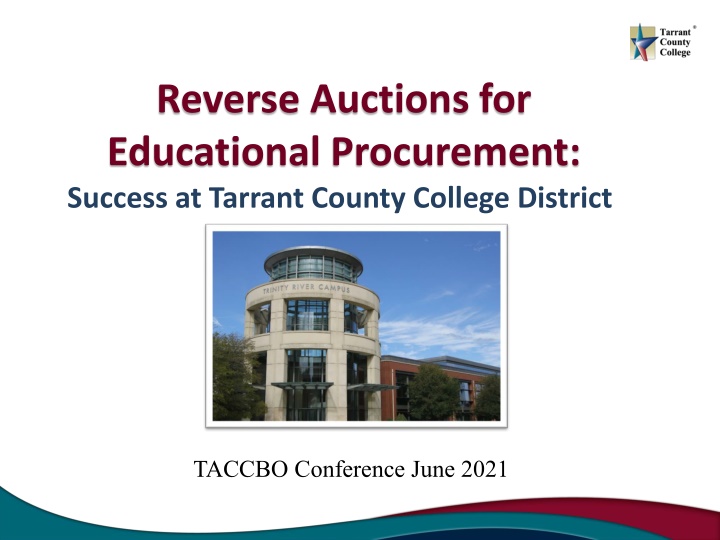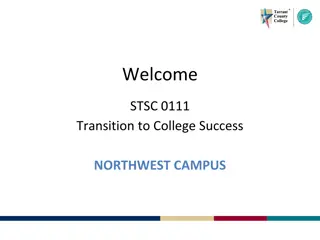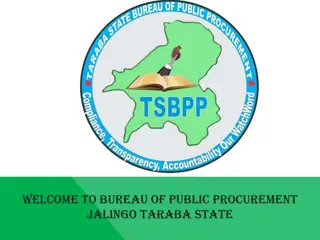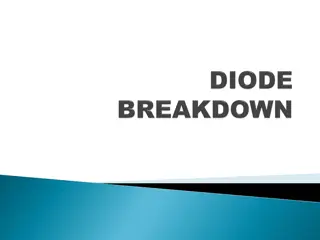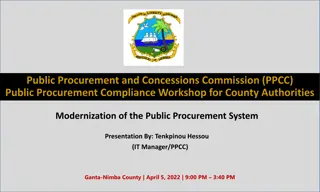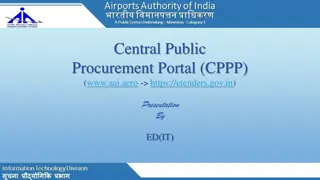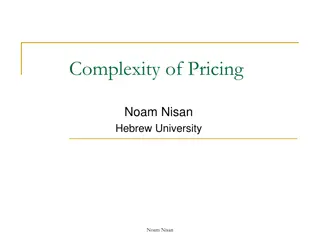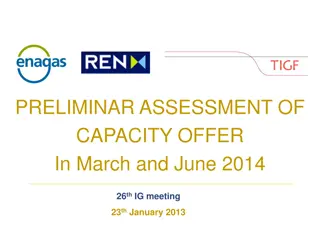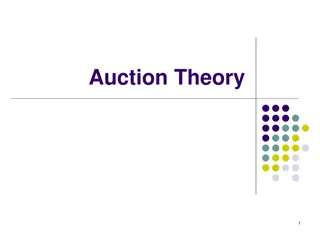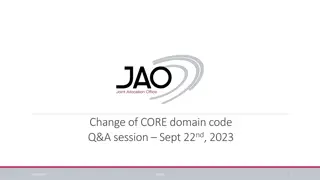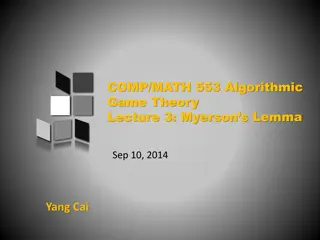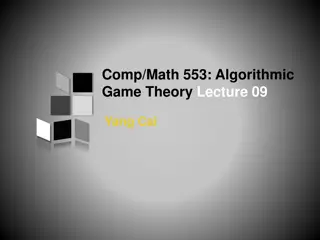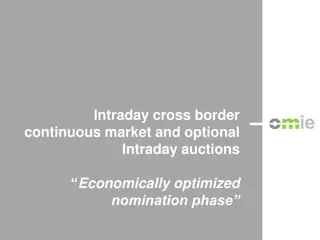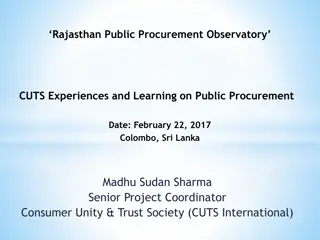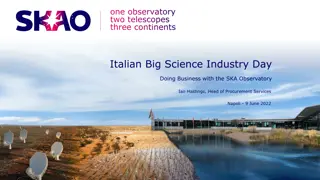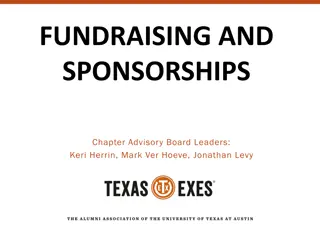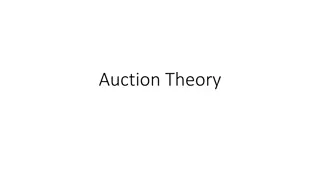Success with Reverse Auctions in Educational Procurement at Tarrant County College District
Tarrant County College District, a comprehensive two-year institution, successfully implemented reverse auctions for educational procurement, achieving cost savings and price compression. The systematic sourcing strategy involved utilizing various tools like group purchasing agreements and competitive solicitation processes. Reverse auctions, as innovative bidding events, facilitated real-time competition among suppliers, ensuring the best market prices for commodities and services. The concept of reverse auctions fostered dynamic interactions between the college and suppliers, leading to increased efficiency and procurement benefits.
Download Presentation

Please find below an Image/Link to download the presentation.
The content on the website is provided AS IS for your information and personal use only. It may not be sold, licensed, or shared on other websites without obtaining consent from the author.If you encounter any issues during the download, it is possible that the publisher has removed the file from their server.
You are allowed to download the files provided on this website for personal or commercial use, subject to the condition that they are used lawfully. All files are the property of their respective owners.
The content on the website is provided AS IS for your information and personal use only. It may not be sold, licensed, or shared on other websites without obtaining consent from the author.
E N D
Presentation Transcript
Reverse Auctions for Educational Procurement: Success at Tarrant County College District TACCBO Conference June 2021
Tarrant County College District Comprehensive two-year institution established in 1965 More than 100,000 students (Credit & non-Credit) are enrolled in TCC's associate degree and technical programs Sixth largest among Texas colleges and universities Five major campuses in the cities of Hurst (Northeast), Fort Worth (Northwest, South, Trinity River) and Arlington (Southeast), with administrative offices in downtown Fort Worth
The Sourcing Strategy The systematic process, utilized to identify the institution s requirements, evaluate market availability, and formally select a supplier to provide those commodities or services to the institution. Developed with specific defined expectations and goals; continuously re-evaluated and improved. Should utilize best in class solicitation methods (tools) to plan and execute the acquisition of commodities and services for the institution.
Tools in the Sourcing Toolbox Group Purchasing Organization Agreements Inter Local Cooperative Agreements Institution s E-Sourcing Catalogs Competitive Solicitation Processes Request For Quotes (RFQ) Invitation To Negotiate (ITN) Invitation To Bid (ITB) Request For Proposals (RFP) Reverse Auctions
What is a Reverse Auction? Reverse Auctions are an innovative tool that should be in the toolbox of every procurement professional. A strategic alternative to traditional bidding, reverse auctions are scheduled real time bidding events utilized to help secure the best available market price for commodities, services and energy- related requirements.
The Reverse Auction Concept Reverse Auctions create a dynamic interaction between the purchasing organization and any number of pre-qualified suppliers competing for the opportunity to supply commodities and/or services to the institution. This interaction is the catalyst to creating price compression and increasing cost savings to the institution.
Where do Reverse Auctions Fit In? Reverse Auctions are incorporated into an institution s sourcing strategy a component of their formal solicitation process. The institution utilizes their process for communicating clear and concise specifications, quantity requirements, and delivery terms, via the solicitation documents (RFx). The RFx documentation includes notification to the suppliers that a Reverse Auction event will be utilized to obtain pricing, and that no pricing is to be included with the original submittals.
Reverse Auction Process 1. Determine the following: the commodity and/or service to be solicited institution s requirements such as specifications, timing, terms and conditions market trends, potential suppliers the solicitation method appropriateness of utilizing a reverse auction event institution s willingness to move spend clear, understandable specifications adequate supplier base 2. Develop and communicate the specifications to the suppliers (RFQ) 3. Open solicitation responses 4. Evaluate submittals those that qualify are then invited to participate in the reverse auction event 5. Schedule and host the reverse auction event
Event Preparation Event Creation: Establish date and time of the event Establish event timing and event extension parameters Post all solicitation documentation on platform Establish an appropriate starting price, minimum bid decrement Register approved suppliers Conduct supplier training and mock reverse auctions as needed Prepare internal team for the event viewing Typical timing for preparation of a RFx reverse auction may take 3-6 weeks. It is important to note that the results of the event will only be as successful as the process and effort put into preparing for the event
The Event Event Day: Invited suppliers login at the appointed time, and may submit bids during the allotted bid timeframe. Provide real time viewing Provide real time reporting Provide supplier assistance if needed Bid timeframe may be extended based on pre-set conditions Bidding ends when the time elapses and no additional bids are received Post-event: Once the event is complete, the results may be used as the deciding factor in an award or as one of several components being weighted in the award decision as previously determined. Communication: Communicate award, provide reverse auction platform partner event feedback as to awarded supplier, event success, etc.
Tarrant County College District: The TCCD process: Identified a need to replace a large number of Desktop and Laptop computers over the next few years. Develop specifications for standard configurations (3 Desktop Configurations, 1 Laptop, and 1 Monitor) Issued RFQ to pre-qualify vendors and equipment (Required vendors to deliver 1 of each configuration for testing by IT Department) Evaluated submissions and approved vendors who met requirements to participate in auction. Scheduled auction through Procurex. Had Procurex demo and train vendors in preparation for live auction. Set date and time for auction. Watched the prices go down!
The Reverse Auction Event The reverse auction event is an online, real-time auction in which approved suppliers are given the opportunity to compete for the institutions business. They do this by reducing their pricing by multiples of the bid decrement value, over the specified bidding period.
Tarrant County College District: Tarrant County College District: Results: 2013-2014 Reverse Auction Description Quantity 2013-14 Unit Price Auction 2013-14 Extended Price Auction 2012-13 Unit Price 2012-13 Extended Price Savings/ Increase Tier 1 Desktop 2,100 $ 676.96 $1,421,616.00 $ 834.05 $1,751,505.00 $329,889.00 Tier 2 Desktop 349 $ 761.28 $ 265,686.72 $ 976.19 $ 340,690.31 $ 75,003.59 Tier 3 Desktop 15 $ 2,015.61 $ 30,234.15 $ 1,770.12 $ 26,551.80 $ 3,682.35 * Laptops 300 $ 813.01 $ 243,903.00 $ 1,322.92 $ 396,876.00 $ 152,973.00 22 Monitor 250 $ 154.24 $ 38,560.00 $ 180.00 $ 45,000.00 $ 6,440.00 $1,999,999.87 $2,560,623.11 $ 560,623.24 * Increase due primarily to an increase in performance specifications on Tier 3 Units
Tarrant County College District: Tarrant County College District: Results: 2016-17 Reverse Auction Description Quantity 2013-14 Unit Price Auction 2013-14 Extended Price Auction 2016-2017 Unit Price 2016-2017 Extended Price Savings/ Increase Tier 1 Desktop 2,100 $ 676.96 $1,421,616.00 $ 611.80 $1,248,780.00 $172,836.00 Tier 2 Desktop 349 $ 761.28 $ 265,686.72 $ 872.48 $ 304,495.52 $ 38,626.80 Tier 3 Desktop 15 $ 2,015.61 $ 30,234.15 $ 2,360.21 $ 35,403.15 $ 5,169.00 * Laptops 300 $ 813.01 $ 243,903.00 $ 784.65 $ 235,395.00 $8,508.00 22 Monitor 250 $ 154.24 $ 38,560.00 $ 126.24 $ 31,560.00 $ 7,000.00 $1,999,999.87 $1,855,633.67 $ 144,366.23 * Increase due primarily to an increase in performance specifications on Tier 3 Units
Tarrant County College District: Results: 2020-21 Reverse Auction Description Quantity 2020-2021 Unit Price Auction2020-2021 Extended Price Baseline 2020-2021 Unit Price Baseline 2020-2021 Extended Price Savings/Increase Auction Tier 1 Go Microsoft 420 $697.00 $292,740.00 $735.00 $308,700.00 $15,960.00 Tier 1 Pro Microsoft 2858 $1,053.00 $3,009,474.00 $1,104.16 $3,155,689.28 $146,215.28 Tier 1 Laptop Microsoft 20 $1,377.90 $27,558.00 $1,439.16 $28,783.20 $1,225.20 Tier 1 Book Microsoft 5 $1,665.20 $8,326.00 $1,774.94 $8,874.70 $548.70 Tier 1 Studio Microsoft 100 $4,347.00 $434,700.00 $4,799.00 $479,900.00 $45,200.00 Tier 2 Go/LTE Microsoft 280 $784.00 $219,520.00 $824.00 $230,720.00 $11,200.00 Tier 2 Pro Microsoft 1225 $1,504.00 $1,842,400.00 $1,584.16 $1,940,596.00 $98,196.00 Tier 2 Laptop Microsoft* 11 $1,340.00 $14,740.00 $2,284.87 $25,133.57 $10,393.57 Tier 2 Book Microsoft** 5 $2,764.70 $13,823.50 $2,609.24 $13,046.20 ($777.30) Tier 2 Studio Microsoft 66 $4,963.60 $327,597.60 $5,016.00 $331,056.00 $3,458.40 VDI Terminal** 1128 $339.40 $382,843.20 $295.27 $333,064.56 ($49,778.64) VDI Laptop 1128 $477.92 $539,093.76 $647.00 $729,816.00 $190,722.24 VDI Zero Client 1128 $368.75 $415,950.00 $493.00 $556,104.00 $140,154.00 Tier 1 Desktop/Different Brands*** 3497 $810.00 $2,832,570.00 $1,553.31 $5,431,925.07 $2,599,355.07 Tier 2 Desktop 1099 $1,253.56 $1,377,662.44 $2,038.40 $2,240,201.60 $862,539.16 Tier 1 Laptop/Different Brands*** 400 $750.00 $300,000.00 $1,245.87 $498,348.00 $198,348.00 Tier 2 Laptop/Different Brands*** 357 $1,751.00 $625,107.00 $2,771.01 $989,250.57 $364,143.57 Tier 1 Tablet 15 $1,131.70 $16,975.50 $1,752.00 $26,280.00 $9,304.50 Tier 2 Tablet 10 $1,452.30 $14,523.00 $2,049.00 $20,490.00 $5,967.00 $12,695,604.00 $17,347,978.75 $4,652,374.75
Tarrant County College District: Thoughts Over time, personal computers have become a commodity item, with not much differentiation between the major vendors (Dell, HP, Lenovo). As the capability differences of the vendors blurs, more emphasis is placed on the services around the equipment (warranties, setup, disposal, imaging). These activities were defined in the RFQ process, and the pricing for preparation with TCC software, warehousing, delivery, setup and extended warranties were included in the costs. Vendor we had used for years (SHI Government Solutions) was the successful vendor in the 2013 Auction. They lost it to another vendor in the 2016 Auction. As previously mentioned, we awarded to 3 different vendors the 3rd time around. One of those 3 was the winning bidder in the second Reverse Auction. The other 2 were new.
The Value Proposition Value Proposition of Reverse Auctions The Value Proposition Buyers Suppliers Dynamic negotiations Committed volume and timing Increased effectiveness in solicitation process Process transparency Equal opportunity for all vendors regardless of geographic location Transparency of the procurement cycle Minimal process cost Market intelligence Real-time feedback on competitiveness of pricing Greater accuracy in price determination Cost savings Shortened time to product delivery
Who Uses Reverse Auctions? Public and Private Sector Procurement Professionals Including: US Customs and Border Patrol (CBP) Defense Logistics Agency (DLA) Corporations: Dell, Sun Microsystems General Electric, GlaxoSmithKline Target, Heinz, Proctor & Gamble Education: Massachusetts Institute of Technology Baylor University California State University System Rensselaer Polytechnic Institute American University
The Players ESG/E&I Cooperative Purchasing Established in 1934, your member owned, not-for-profit purchasing cooperative focused completely on Educational Procurement. Serving almost 3,000 member institutions nationwide. Procurex, Inc ESG s reverse auction partner, providing the platform on which we run the Reverse Auction events. Established in 2002, having successfully completed more than 20,000+ sourcing events managing more than $20 billion in total spend.
Thank you! Mike Herndon Executive Director of Procurement Tarrant County College District 817.515.1502 Michael.herndon@tccd.edu www.tccd.edu
